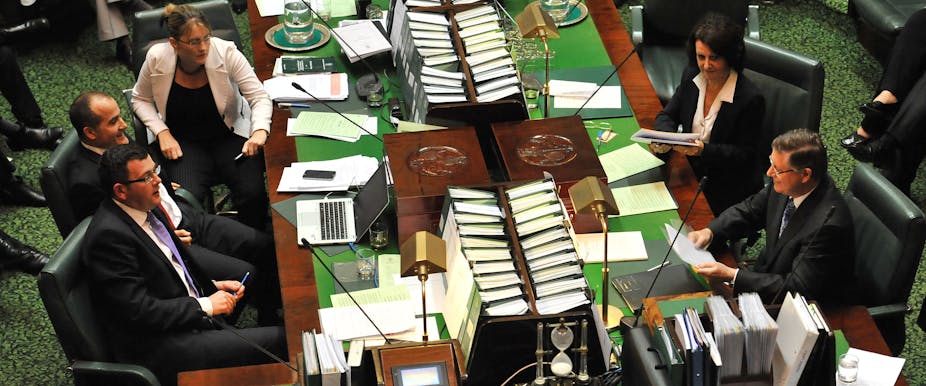A fundamental lack of trust is at the heart of Australian politicians’ extremely poor reputation. It is the main reason why people’s opinions about their elected representatives have mutated from healthy scepticism into corrosive cynicism. Unless we can find a way to break the vicious circle of mistrust, public disdain will infect the health of the institutions that are the foundation and framework of our democratic political system.
So what can be done? Our group, the Accountability Round Table, believes that an important place to start is in Victoria, ahead of the upcoming state election.
The Accountability Round Table is a non-partisan, national body involving former politicians from all major political parties, former judges, current and former academics, lawyers, journalists and other citizens. They all share common concerns about declining standards in public life.
We have sent a letter (with detailed attachments) to the leaders of Victoria’s major political parties. This seeks a pre-election commitment to act on three serious issues after the November 29 poll. We’ve called on all parties to support:
- Giving greater powers to Victoria’s Independent Broad Based Anti-Corruption Commission (IBAC)
- Holding an inquiry into public funding of political parties, individual members of parliament and political candidates
- Strengthening the public’s right to know, with improved Freedom of Information rules.
And for anyone who thinks such accountability measures don’t matter, they do – including having significant, practical economic consequences.
Tackling corruption
Victoria does not have an effective anti-corruption body. That’s why we’re calling for Victoria’s IBAC to be given the same ability as New South Wales’ highly effective Independent Commission Against Corruption (ICAC) to tackle suspected and known misconduct and corruption.
While recent changes introduced into the Victorian Parliament address some of the shortcomings in the IBAC Act, they fail to give Victorians what the government promised at the last election: an anti-corruption body for Victoria akin to ICAC.
Like ICAC, IBAC needs the powers to investigate any allegations or complaints that in its Commissioner’s opinion implies “corrupt conduct may have occurred, may be occurring or may be about to occur”.
The ability to do this has been central to ICAC’s capacity to peel back the layers of unethical and organised scheming by politicians (and others) in NSW and to turn the accountability spotlight onto political funding matters.
To reveal and then reverse unethical and potentially illegal practices, any independent anti-corruption body – and this includes Victoria’s IBAC – requires the powers of NSW’s ICAC. Without it, political funding and other matters cannot be effectively scrutinised.
The discretion granted to the anti-corruption Commissioner is a key factor here. The Victorian government needs to trust those it appoints to head accountability institutions to use their discretionary powers wisely. It is not as if there are no checks and balances in place.
IBAC, like ICAC, is monitored and reviewed by an all-party parliamentary committee. The Victorian Inspectorate can monitor IBAC’s compliance with its statutory obligations and investigate any complaints against the anti-corruption body and its staff.
Cleaning up political funding
Victoria lacks appropriate mechanisms for ensuring that funding of political parties does not lead to anti-democratic or corrupt outcomes. That is why we’re calling for an inquiry into political funding.
Specifically, we believe a referral should be given to the Joint Electoral Matters Committee to inquire into the accountability regime of Victoria’s current political funding rules.
Its terms of reference should include a requirement that the committee make recommendations for the legislation needed to provide a system of political funding that will serve and enhance our democracy.

For example, the practice of raising funds by offering access to members of parliament at functions, particularly senior ministers and shadow ministers, is a major and growing concern.
Payments for access are already a significant source of funding for Australian political parties, as shown in Joo-Cheong Tham’s book Money And Politics: The Democracy We Can’t Afford.
The public’s right to know
It’s also time to overhaul the philosophy underpinning current Victoria’s Freedom of Information laws. We’re asking political parties and individual politicians in Victoria to commit to adopting the model recommended by the 2008 Solomon Report, which is now in place in Queensland and Tasmania.
This is based on people’s “right to know” information, also known as the Right to Information principle.
This stands in contrast to Victoria’s approach to Freedom of Information, where public servants respond to specific requests for information. Not all requests are granted and, when they are, full disclosure is not always forthcoming.
The Right to Information principle dictates that governments and public servants respect the community’s right to information about government and public servants’ actions. The only exception is when it is very clear that the public interest requires non-disclosure.
The value of open government
Accountability may not seem like the most important issue at this year’s Victorian election. Yet it is vitally important, not just at a state level, but nationally and internationally.

An open and accountable government is crucial for economic growth. International recognition of the link between the two led to the creation in 2011 of the Open Government Partnership.
Some 64 nations including Australia have joined or applied to join this partnership. They have done so because they recognise that economic growth depends on transparent government and that this approach fosters a better life for the many, whereas secrecy only benefits the few.
While the three areas of reform that our group has nominated could be addressed separately, they will be more effective if they are seen as part of an accountability package.
While it may be self-evident to many that corruption thrives on secrecy, Victoria’s accountability regime still does not reflect this well-known truth. It should.

